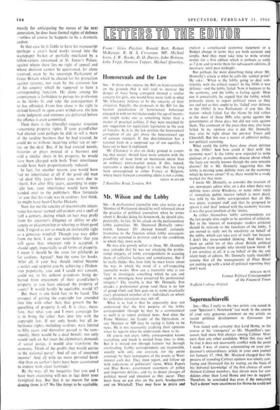Mr. Wilson and the Lobby SIR.—A professional journalist who also
writes as a Member of Parliament should be well informed about the practice of political journalism when he writes about it. Besides doing his homework, he should also, preferably, be fair. In his attack on the parliamentary lobby journalists, Mr. Desmond Donnelly (SPEC- TATOR. January 28) showed himself curiously insensitive to the function which lobby correspon- dents are expected to perform and to the conditions in which they must work.
He was also grossly unfair to them. Mr. Donnelly may consider that he was not attacking the profes- sional integrity of lobby correspondents in accusing them of collective laziness and complacency. But if he really thinks this, how little he must know about the way in which the mind of a self-respecting journalist works. How can a journalist who is too 'lazy' to investigate something which he can and ought to investigate have preserved his professional integrity? The trouble is that Mr. Donnelly first attacks a professional group (and there is no law of group libel) and then goes on to name practically every prominent member of it—individuals on whom his collective aspersions may rub off.
What is as bad is that he apparently does not understand that the first purpose of the lobby correspondent (though he may be a commentator as well) is to report political news. And what the Prime Minister, the Leader of the Opposition, or any Minister or MP may be saying is liable to be news. He is not necessarily crediting their opinions when he reports what he understands them to be.
Of course not every lobby correspondent knows everything and much is missed from time to time. But it is missed not through laziness but through overloading. Lobby correspondents are responsible. usually with only one assistant, for the entire coverage by their newspapers of the events at West- minster each day. They must report, and follow up with indications of politicians' views, White Papers and Blue Books, government statements of policy and important debates, and try to detect changes of political mood and intention as they occur. They must have an eye also on the party headquarters and on Whitehall. They may have to precis and explain a complicated economic statement or a Budget change in terms that are both accurate and simple. And they must take time to write several stories for a first edition which is perhaps as early as 7 p.m. and re-write them for subsequent editions, if necessary. until past midnight. But perhaps the most disturbing thing about Mr. Donnelly's article is what he calls the 'central point.' He asks : 'When is the lobby going to deal con- sistently with the critical issues? In the 1930s it was defence—and the lobby failed. Now it happens to be the economy, and the lobby is failing again.' How can it conceivably be argued that the lobby, which primarily exists to report political views as they are and not as they ought to be, 'failed' over defence in the 1930s? It was Parliament—if you like. the nation—which failed. Let the blame be laid rather at the door of those MPs who spoke against the governments of those days but did not vote against them. The comment of the press then may also have failed. In my opinion also it did. Mr. Donnelly may also be right about the pre-war Times and Churchill. But this was a matter of editorial policy, not political reporting.
What could the lobby have done about defence in the 1930s? And how could it 'deal with' the economy now? Is the lobby now expected to write analyses of a chronic economic disease about which the facts are mostly known though the cure remains elusive? Or is Mr. Donnelly suggesting that the lobby is missing some definite story on the economy which he knows about? If so, there would be a ready market for that story.
I invite Mr. Donnelly to consider the reaction of any newspaper editor who, on a day when there was definite news about Rhodesia, or some other topic of immediate public interest (which is most days), was told by his lobby correspondent that all this was pretty transient stuff and that he proposed to ignore it and 'deal' instead with the economy because it was the great problem of the 'sixties.
As critics themselves, lobby correspondents are the last people who ought to be sensitive of criticism. But in the interest of newspaper readers criticism should be relevant to the functions of the lobby. I am moved to reply not by sensitivity on behalf of the lobby, which can take care of itself, but because I don't like loose-minded thinking. And there has been an awful lot of this about British political journalism from people who should know better. If I am sensitive at all, it is on behalf of the shy and silent body of editors. Mr. Donnelly really shouldn't assume that all the managements of Fleet Street are putting up with a kind of political reporting they don't want.
RONALD Burr
Former Political Correspondent of the Financial Times Nuffield College. Oxford


































 Previous page
Previous page